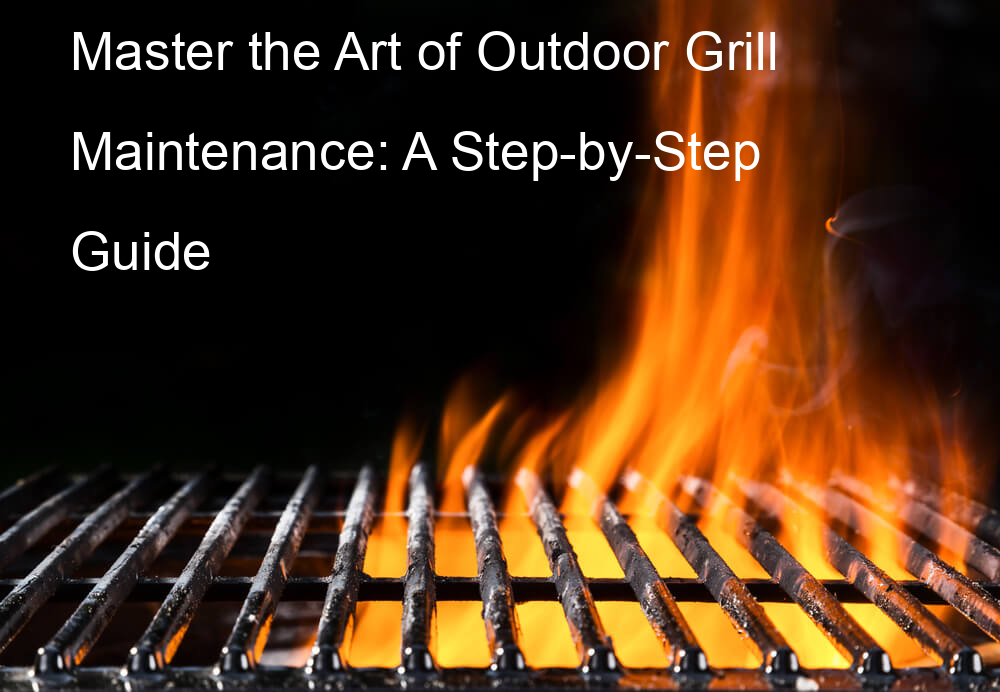Introduction to Outdoor Grill Maintenance
Outdoor grills are a popular choice for many food enthusiasts. They offer a unique way of preparing food that can’t be replicated in the kitchen. However, to keep your grill in top shape, regular maintenance is crucial. Let’s dive into the importance of regular grill maintenance and the benefits of maintaining BBQ grills.
- Importance of Regular Grill Maintenance
- Benefits of Maintaining BBQ Grills
Regular maintenance of your outdoor grill is essential for several reasons. First, it ensures that your grill is always ready to use. You don’t want to plan a BBQ party only to find out that your grill isn’t working properly. Second, regular maintenance extends the lifespan of your grill. Just like a car, a grill that is well-maintained will last longer. Lastly, regular maintenance improves the taste of your food. A clean grill will not have any leftover residues that can alter the taste of your food.
Maintaining your BBQ grill comes with a plethora of benefits. One of the most significant benefits is that it enhances the flavor of your food. A well-maintained grill will provide a consistent and smoky flavor to your food that is hard to achieve otherwise. Additionally, regular maintenance reduces the risk of flare-ups and other safety hazards. Lastly, it saves you money in the long run. While you might have to spend a little on maintenance, it is much cheaper than having to buy a new grill.
In conclusion, regular maintenance of your outdoor grill is not just important, it is necessary. It ensures that your grill is always ready to use, extends its lifespan, and improves the taste of your food. So, if you want to enjoy delicious BBQ food, start maintaining your grill today.
Understanding Your Outdoor Grill
Grilling is a favorite pastime for many, but to truly enjoy it, you need to understand your grill. This includes knowing the different types of grills and their key components. Let’s dive in!
- Different Types of Outdoor Grills
- Charcoal Grills: These grills use charcoal briquettes for cooking. They are popular for the smoky flavor they give to food. However, they take longer to heat up and require more cleanup. Learn more about Charcoal Grills.
- Gas Grills: These are the most common type of grill. They use propane or natural gas, heat up quickly, and are easy to clean. Learn more about Gas Grills.
- Electric Grills: These grills use electricity and are perfect for people who live in apartments or places where gas or charcoal grilling is not allowed. Learn more about Electric Grills.
- Pellet Grills: These grills use wood pellets for heat and smoke, offering a rich, wood-fired flavor. They are versatile and can grill, smoke, and even bake. Learn more about Pellet Grills.
- Key Components of a Grill
- Grill Grates: This is where you place your food to cook. They can be made of different materials like cast iron, stainless steel, or porcelain-coated cast iron.
- Heat Source: This could be charcoal, gas, electricity, or wood pellets, depending on the type of your grill.
- Heat Diffuser: This component spreads the heat evenly across the cooking surface.
- Temperature Control: This could be a dial or a vent that allows you to control the heat level.
- Hood: The hood helps to trap heat and smoke, creating a convection effect for even cooking.
There are several types of outdoor grills, each with its unique features and benefits. Here are the most common ones:
Understanding the key components of a grill can help you use it more effectively and maintain it properly. Here are the main parts:
Now that you understand the different types of grills and their key components, you’re ready to grill like a pro! Remember, the key to great grilling is understanding your grill and how to use it effectively.
Outdoor Grill Care: Getting Started
Proper care and maintenance of your outdoor grill can significantly extend its lifespan and improve the quality of your barbecues. In this section, we will delve into some essential grill cleaning techniques that every grill enthusiast should know.
Grill Cleaning Techniques
Cleaning your grill is not as daunting as it may seem. With the right tools and techniques, you can have your grill sparkling clean and ready for your next cookout in no time. Here are some steps and tools you will need:
- How to clean a grill: Step-by-step
- Tools needed for grill cleaning
First, ensure your grill is cool to avoid burns. Remove the grates and burners, if possible, and soak them in warm soapy water. Using a grill brush, scrub off any residue on the grill’s interior. Rinse the grates and burners, dry them thoroughly, and then replace them. Lastly, wipe down the exterior of the grill with a damp cloth.
The essential tools for cleaning a grill include a grill brush, a bucket of warm soapy water, a sponge or cloth, and gloves for protection. You may also consider using a grill cleaning spray for stubborn stains.
Remember, regular cleaning not only keeps your grill looking great, but it also enhances its performance and safety. So, don’t wait until your grill is caked with grease and food particles; make grill cleaning a routine.
Grill Maintenance Tips
Keeping your grill in top shape is essential for ensuring it lasts for many years and delivers the best cooking results. Here are a couple of key maintenance tips to help you get started:
- Regular Cleaning Schedule
- Proper Storage of Outdoor Grills
Maintaining a regular cleaning schedule is crucial for the longevity of your grill. Over time, grease and food particles can build up, which can lead to flare-ups and uneven cooking. It’s recommended to give your grill a deep clean every few months, depending on how often you use it. In addition, a quick clean after each use can help prevent buildup. This involves removing any leftover food particles and lightly cleaning the grates.
Proper storage of your outdoor grill is just as important as regular cleaning. When not in use, especially during the colder months, it’s best to store your grill in a dry, covered area to protect it from the elements. If you don’t have a suitable indoor space, a high-quality grill cover can also do the trick. This can help prevent rusting and keep your grill in good condition for longer.
Remember, a well-maintained grill not only lasts longer but also delivers better cooking results. So, make these tips part of your grill care routine and enjoy delicious barbecues for many years to come!
Advanced Grill Maintenance Guide
Deep Cleaning Outdoor Grills
Deep cleaning your outdoor grill is an essential part of grill maintenance. It not only ensures that your grill remains in top condition but also enhances its performance and longevity. Let’s delve into the specifics of when and why to deep clean your grill and a step-by-step guide to doing so.
- When and why to deep clean your grill
- Step-by-step guide to deep cleaning
- Preparation: Gather all the necessary cleaning supplies such as a grill brush, soapy water, a bucket, and gloves.
- Pre-cleaning: Start by removing the grates and burners. Brush off any loose particles using the grill brush.
- Soaking: Soak the grates and burners in soapy water for about 30 minutes to loosen any stubborn grime.
- Scrubbing: After soaking, scrub the grates and burners thoroughly. Make sure to clean the inside of the grill as well.
- Rinsing and drying: Rinse off all the parts with clean water and let them dry completely before reassembling.
- Reassembly: Once everything is dry, reassemble the grill. Now, your grill is ready for use!
As a rule of thumb, a thorough deep cleaning of your grill should be done at least once or twice a year, preferably at the start and end of the grilling season. However, if you use your grill frequently, you might need to deep clean it more often.
Deep cleaning your grill is crucial for several reasons. Firstly, it helps remove accumulated grease and food particles that can cause flare-ups and uneven heating. Secondly, it prevents the growth of harmful bacteria that can contaminate your food. Lastly, it helps to extend the lifespan of your grill by preventing rust and corrosion.
Deep cleaning your grill might seem like a daunting task, but with the right tools and steps, it can be quite simple. Here’s a step-by-step guide:
Remember, a well-maintained grill not only cooks better but also lasts longer. So, make sure to incorporate deep cleaning into your grill maintenance routine. Happy grilling!
Maintaining BBQ Grills: Special Considerations
While keeping your grill clean and performing regular maintenance is crucial, there are some special considerations to keep in mind. These include dealing with rust and corrosion, and replacing grill parts when necessary.
- Dealing with Rust and Corrosion
- Replacing Grill Parts
Rust and corrosion can significantly reduce the lifespan of your grill. They occur when the grill is exposed to moisture and oxygen over time. To prevent rust, it’s important to clean your grill regularly and keep it covered when not in use. If you notice rust, don’t panic. You can remove it using a wire brush and some elbow grease. After removing the rust, apply a rust-resistant primer and paint to protect the grill. For more information on dealing with rust and corrosion, you can visit this Wikipedia page.
Over time, certain parts of your grill may need to be replaced. This could include the grill grates, burners, or even the ignition system. When replacing parts, make sure to consult your grill’s manual to ensure you purchase the correct replacements. Remember, using the wrong parts can lead to poor performance and even safety issues. Regularly inspect your grill and replace parts as needed to keep your grill running smoothly and efficiently.
Outdoor Grill Upkeep: Long-Term Strategies
When it comes to outdoor grills, long-term maintenance is key. It’s not just about the immediate cleaning after a barbecue session, but also about the seasonal upkeep that ensures your grill stays in top shape year-round. Let’s delve into the strategies for seasonal grill maintenance.
Seasonal Grill Maintenance
Seasonal maintenance is an essential part of outdoor grill upkeep. It involves preparing your grill for the winter months and getting it ready for the grilling season. Here’s how:
- Preparing Your Grill for Winter
- Clean the grill thoroughly. Remove any food residue and grease to prevent them from hardening over the winter.
- Apply a protective cover. This will shield your grill from the harsh winter elements.
- Store it in a dry place. If possible, keep your grill in a shed or garage to protect it from moisture.
- Getting Your Grill Ready for the Grilling Season
- Remove the cover and inspect your grill for any signs of damage or rust.
- Clean the grill grates. This will ensure your food doesn’t stick and will improve the flavor.
- Check the propane tank or charcoal supply. Make sure you have enough fuel for the grilling season.
Winter can be tough on outdoor grills. The cold weather and moisture can cause rust and other damages. Here are some steps to prepare your grill for winter:
As the grilling season approaches, it’s time to get your grill back in shape. Here’s how:
By following these seasonal maintenance tips, you can extend the lifespan of your grill and ensure it’s always ready for a barbecue. Remember, a well-maintained grill not only lasts longer but also provides better tasting food.
Investing in Grill Maintenance
Proper grill maintenance is an investment that pays off in the long run. Let’s take a closer look at the cost of neglecting grill maintenance and the benefits of investing in it.
- Cost of Neglecting Grill Maintenance
- Benefits of Investing in Grill Maintenance
Neglecting grill maintenance can lead to a variety of problems. For one, your grill may not heat up properly, leading to uneven cooking. Worse, it could even become a fire hazard. According to a Wikipedia article, improper maintenance and cleaning can lead to dangerous flare-ups.
Moreover, the lifespan of your grill can drastically decrease without proper care. This means you may have to replace it sooner, leading to more costs in the long run. In fact, a grill that is not maintained can last only 2-3 years, while a well-maintained one can last up to 10-15 years.
Investing in grill maintenance has many benefits. Firstly, it ensures that your grill functions optimally, providing you with the best grilling experience. It also extends the lifespan of your grill, saving you money in the long run.
Regular maintenance can also prevent potential safety hazards, such as flare-ups and gas leaks. This not only protects you and your family but also gives you peace of mind every time you use your grill.
Lastly, a well-maintained grill retains its aesthetic appeal, making your outdoor cooking experience more enjoyable.
In conclusion, investing in grill maintenance is not only beneficial for your grill’s performance and lifespan, but it also ensures your safety and enhances your grilling experience. So, don’t neglect your grill – invest in its maintenance today!
Conclusion: Mastering the Art of Grill Maintenance
As we conclude our comprehensive guide on grill maintenance, it’s essential to remember that the longevity and performance of your grill largely depend on how well you maintain it. With the right knowledge and a little effort, you can master the art of grill maintenance and enjoy delicious barbecues for years to come.
- Key Takeaways
- Understanding your grill: Knowing the different parts of your grill and their functions is the first step towards effective maintenance.
- Getting started with grill care: Regular cleaning and inspection are crucial. Always ensure your grill is clean and free from any debris before and after use.
- Advanced grill maintenance: This involves deeper cleaning and replacing parts when necessary. Always refer to your grill’s manual for specific instructions.
- Long-term grill upkeep strategies: Protect your grill from the elements by using a grill cover and storing it in a dry place. Regularly check for rust and address it promptly.
- Final Thoughts on Grill Maintenance
Throughout this guide, we’ve covered a lot of ground on grill maintenance. Here are the key points to remember:
Grill maintenance might seem like a daunting task, but it’s a worthwhile investment. A well-maintained grill not only lasts longer but also ensures your food tastes great every time. Remember, the key to mastering grill maintenance is consistency. With regular care and attention, you can keep your grill in top shape and enjoy many seasons of grilling.
So, whether you’re a seasoned grill master or a beginner, we hope this guide has provided you with valuable insights into grill maintenance. Happy grilling!






